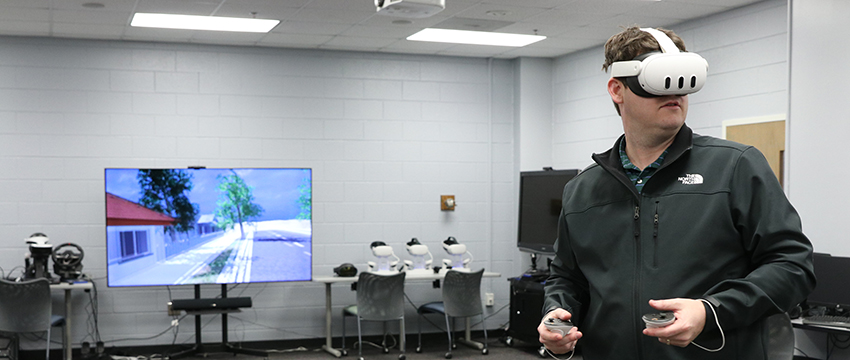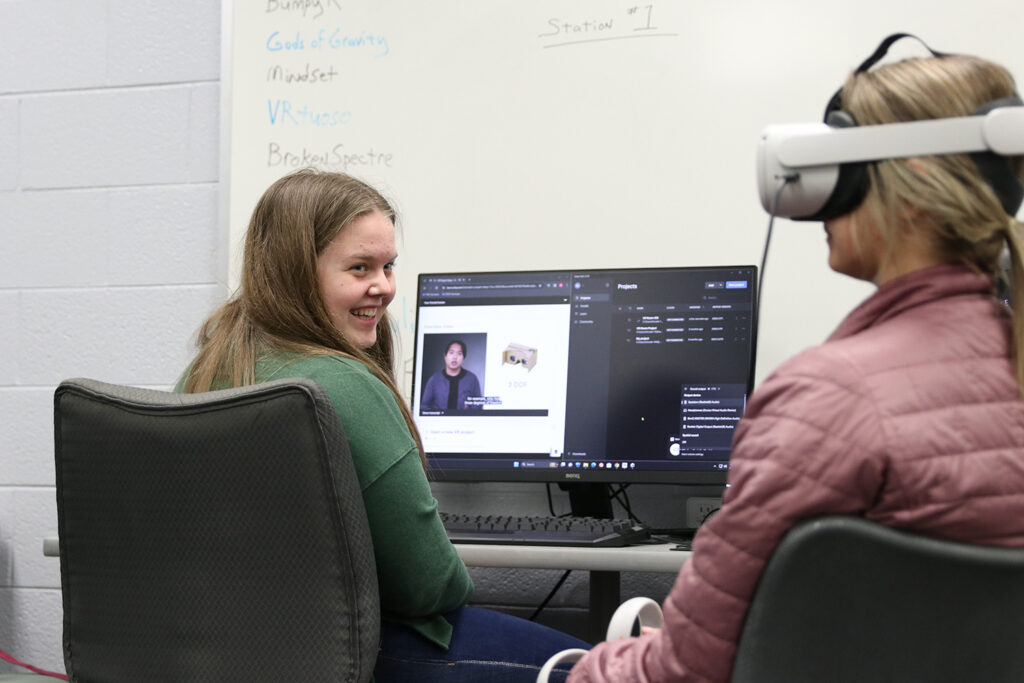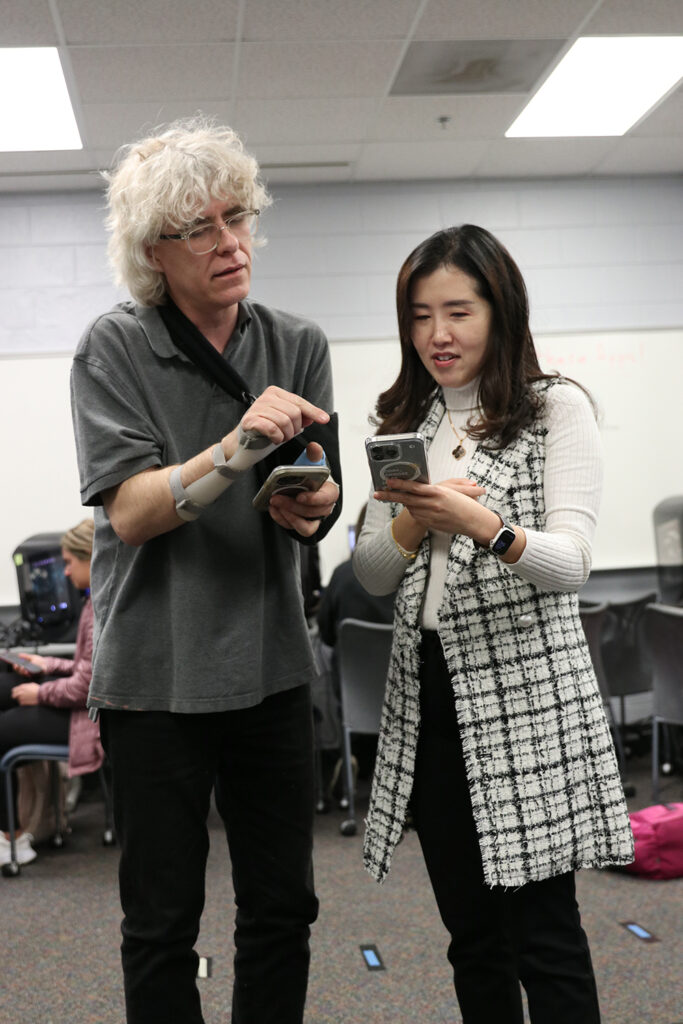Center for Advanced Computer-Human Ecosystems provides VR research opportunities

Center for Advanced Computer-Human Ecosystems provides VR research opportunities
The Center for Advanced Computer-Human Ecosystems, or CACHE for short, is now open and features a collaborative research hub housed in Grady College of Journalism and Mass Communication, and joined by the College of Engineering, the College of Public Health, and other units on campus who have a shared vision for using emerging technologies for transdisciplinary research.
“The goal of the CACHE center is to engage in interdisciplinary research to explore how humans interact with computers and boost performance with variety of technologies,” said Sun Joo “Grace” Ahn, founding director of the center and professor at Grady College of Journalism and Mass Communication. “This provides a unified umbrella and the opportunity to better pool resources and answer more complicated questions.”
The new CACHE lab features immersive and interactive virtual environments, including virtual- augmented- and mixed-realities to address timely societal issues such as health inequities, physical and mental well-being, and climate change.
In addition to Ahn, the center is co-directed by Kyle Johnsen, professor in the College of Engineering and Allan Tate, assistant professor in the College of Public Health.
“It’s a really exciting time to be involved in research that looks at how humans interact with computers,” Ahn continued. “Our interactions with computers have important implications for real world problems and how we can leverage these technologies to help us be healthier, more environmentally conscious, make informed choices as consumers, and have a better sense of the world.”
Ahn further explains that immersive media, such as VR, can provide a rich media experience to users because it uses multiple layers of sensory cues, helping people internalize messages with more details in their media experience. Research has shown that VR is not just for playing games, but also a powerful communication tool in terms of telling vivid stories and providing audiences a way to live through stories together.
“The future of VR lies in concept of a metaverse where you have multiple users sharing the same space and getting excited together and sharing experiences together,” Ahn said.
Interdisciplinary Research

While housed on the fifth floor of Grady College, the CACHE center is designed to foster research collaboration with any UGA unit that has a shared vision of integrating emerging technologies to improve daily lives.
The College of Public Health is one of the partners in the new center and already conducts a lot of research focused on critical public health issues that can be delivered through VR.
“Public health is at the intersection of technology and human behavior, and there are emerging needs to better understand how virtual environments can be used,” said Tate. “Understanding how health develops where people play is a central component of Healthy People 2030 targets, and where people play is increasingly becoming virtual and/or integrated with augmented technologies in everyday life.”
Another founding partner of the CACHE center is the College of Engineering.
“Collaborating labs help us leverage our mutual strengths to do research at scales that neither of our groups could accomplish alone,” Johnsen said. “We realized that we were developing human-computer technological ecosystems that are really a new field of study, and that forming a joint center would allow us to formalize it and help promote its growth.”
“Many research questions are not single disciplined,” Ahn explained. “They are multi-layered and by allowing more resources to be banded together, it gives us the chance to tackle more complicated problems and leave a bigger impact.”
CACHE center facilities
The CACHE center is one of the few VR labs nationwide with the capability to produce immersive VR experiences in-house from inception to completion.

According to Wes Unruh, CACHE center administrator, CACHE is a full-service center for immersive media content production, featuring not only games and apps for UGA students to explore, but also a state-of-the-art research arm that allows doctoral students and faculty to conduct research, implement studies, and publish papers through the space.
“I enjoy being 20 minutes into the future,” Unruh said.
The CACHE center features enough room-scale VR stations where up to 15 participants can be run through studies simultaneously.
In addition, CACHE also features the latest in new wireless technology, including a large collection of Meta Quest 2 and Quest 3 headsets, which open opportunities for researchers to engage in studies outside of the research space.
For example, researchers recently took 20 Quest 2 headsets to South Carolina in collaboration with Clemson University to conduct research with the Hurricane World program, which simulates what damage can be done to homes on the coast when hurricanes strike.
The center is open to classes of students who want to visit the space and explore how VR can enhance their learning. For instance, screenwriting classes can benefit from learning how to write for interactive and immersive projects, while journalism students can learn more about documentaries that are filmed in 180-degree formats.
“Large narratives need to be experienced,” Unruh predicts, “and being exposed to this new media and learning to write for immersion will make you more valuable five years from now.”
While research is a main goal, fun and exploration are an important mission of the CACHE center as well, whether a student is looking to create music in the latest version of Virtuoso, or unwinding by running through a maze in NoClipVR.
The CACHE center folds the former Games and Virtual Environments Lab and the Virtual Environment Room and Gaming Experience lab into a single, unified space.
The CACHE center is open to any students to visit Monday through Thursday from 10 a.m. until 3 p.m., and Fridays by appointment.
UGA units interested in discussing collaboration projects in the new CACHE center are invited to contact Ahn by email at sjahn@uga.edu.
For more information, please listen to the Grady Research Radio podcast interview with Grace Ahn.
Author: Sarah Freeman, freemans@uga.edu